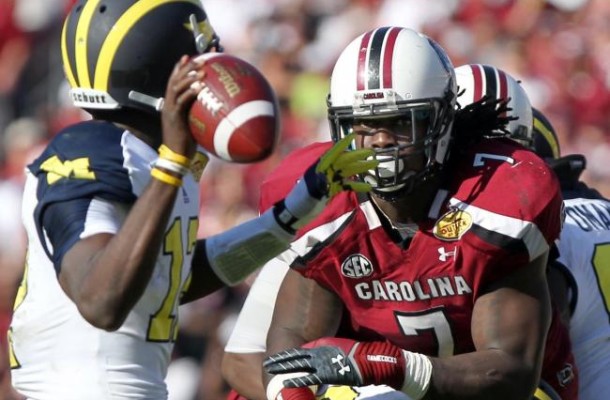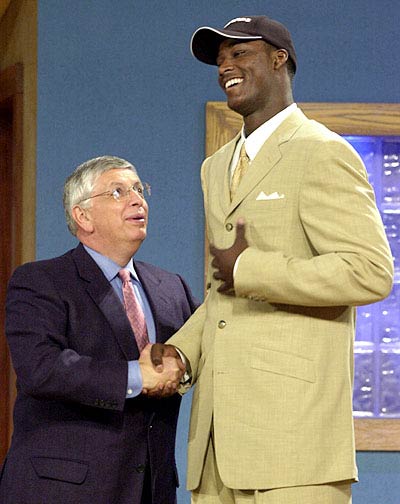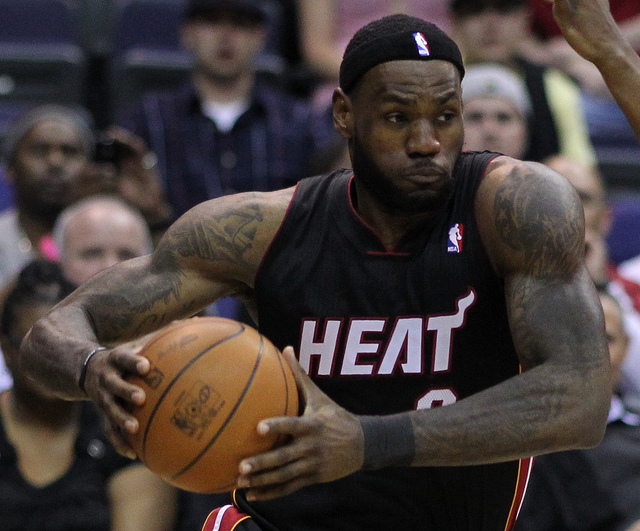To Be Young, Gifted and Unpaid

Jadeveon Clowney, Photo courtesy of bleacherreport.com
Restraint of trade vs. freedom to make a living…a debate that comes up from time to time has just re-emerged in recent days with the names Jadeveon Clowney and Nerlens Noel, two #1 talents (and two great names).
This got kicked off the other day when a writer speculated that Jadeveon Clowney, DE/Beast of the South Carolina Gamecocks, might want to sit out the 2013 season and wait for the 2014 NFL Draft (he’s a true sophomore), thus avoiding potential injury and skating to his 1st big payday. If Clowney was available for the upcoming NFL Draft he’d be the likely #1 overall pick.
A few nights later Nerlens Noel of the Kentucky Wildcats tore up his ACL and ended his season. Some speculated that he never should have been at Kentucky, he should be in the NBA as he was the top recruit in this freshman class and a sure NBA 1st rounder if he was eligible in 2012.
Age-eligibility rules in the 3 major leagues look like this:
- MLB: Players from US, Canada, Puerto Rico eligible when their HS class graduates, foreign players can sign at 16
- NFL: Eligible 3 years after their HS class graduates
- NBA: Eligible 1 year after their HS class graduates
So why the tension on pro eligibility? On one hand you’ve got precocious young talent that wants or needs to start earning ASAP. And only in sports is a person restrained from making a living when they are able…if they were hot shot 17-year-old programmers they’d be free to sign with Facebook. Why can’t they play for pay?
On the other side you’ve got pro teams competing with each other to snag young talent. Ever since Michael Jordan was passed over for Sam Bowie in the 1984 NBA Draft the term “ceiling” has been etched in the brain of all talent evaluators, i.e. nobody wants to miss out on a potentially transformational player because of need. And so they’ve erred on the side of reaching for young flashes of brilliance, even if it hasn’t been proven vs. real competition.
So we’re all agreed, clubs, players…age-eligibility be damned, right? Not so fast. The leagues want to protect teams from themselves, that is, from throwing big money at unproven talent.
In MLB they’ve pretty much got an open market age-wise with the HS rule and they support their investments with the minor league development system. In the NBA and NFL their feeder system is the college game. Generally NFL players still need some time to physically mature and face better competition after HS; NBA players can be ready physically and mentally, but for every LeBron James or Kobe Bryant there’s a Kwame Brown or a Darius Miles.
The NBA and NFL are getting a free ride on the NCAA and they know it. An MLB team may spend $15M-$25M per year supporting their minor league operations; NBA and NFL teams spend zero. They keep the post-HS eligibility rules because they never want to get into the player development business…keeping the college game healthy is good for league business and good PR. And they don’t want their clubs to get into dead contracts on teenage busts.
However when you look at the law and precedents in other industries (including MLB) it’s hard to imagine that the NBA/NFL eligibility rules would stand up to a legal challenge. Certainly it would take a unique situation for a youngster to sue the one organization where he hopes to make his livelihood. But such was the case with Ohio State’s Maurice Clarett who led the Buckeyes to a National Championship in 2002 as a freshman and was booted off the team as a soph. He sued to be included in the 2004 NFL Draft, won the case at trial, but was overturned on appeal (interestingly on an opinion by Judge Sonia Sotomayor). It’s really only a matter of time before the right case with the right attorney wins this argument and overturns the arbitrary age eligibility rules.
So what’s the “right” answer on this? Logic and wisdom says that most ‘kids’ are not ready to be pros at 18, either physically or mentally. On the other hand baseball players do it. And some ‘kids’ are very ready…LeBron, Kevin Garnett, Bryce Harper, Mike Trout. We consider them adults at 18, they should be allowed to sell their services. As for the employers it should be ‘buyer beware’…MLB has certainly operated with this mindset for a long time.
As for the NBA and NFL they may need to someday find a way to fund a true player development system to accomodate their young prodigies…like create their own minor league system or subsidize the NCAA. Heck the NCAA is semi-pro already, but that’s all material for another post…
So to torture a phrase, “Set my (young) people free (to get paid)“








Todd
February 15, 2013 at 8:08 am
Hey Dave - Nice article. I don’t necessarily disagree with you, but I’m going to make a few points to play devil’s advocate.
While there are certainly companies like Facebook that may hire someone at 18 based on pure skill, most companies have requirements of a degree for entry level positions and proven experience for a mid-level position where you are taking on a bulk more of the responsibility. So it’s not unprecedented to put prerequisites on a job descriptions by any means, it just happens that the leagues put age as a requirement. If they changed it to needing an associate’s degree would it be perceived differently although achieving the same objective?
Now that’s just to defend the league’s on their requirements. I definitely agree that the college level is the development program that saves them a ton of money, but let’s look at the players need for maturation. The obvious cases for good players, as you mentioned, Kobe, Lebron, KG, etc. and the bad ones like Kwame Brown. But what about a case like Dwight Howard? He was/is a great talent and can deliver on the floor, no question (when healthy and motivated), but look at his life off the court in direct relation to the sport. What he did to the Orlando Magic was what an eighth grader does when they feel guilty about breaking up with a girl they’ve been holding hands with for two weeks. It doesn’t seem like it was just Orlando either, his presence in LA has constantly been referred to as toxic by people in the know. So even if a young man is physically capable of being on the floor with professional athletes, is he ready to become a man and work in the real professional world?
Dave Graziano
February 15, 2013 at 11:41 am
Thanks for that Todd, I completely hear you, the other side of the argument…I wrestled with this, it’s a tough problem (making for a good topic). in the end I think it’s a question of the regulator vs the libertarian, i.e. trying to protect people vs. the freedom of athletes to choose their destiny and the freedom of clubs to take their chances. MLB has dealt w/ these issues forever and factor the risks into their $$ commitments, and they invest in their prospects. no reason why NBA and NFL can’t adapt similarly and sort it out. it’s a dangerous place to go, to do away w/ those requirements, but logically I don’t see how they stand up to the light of day once challenged properly, esp in hoops.